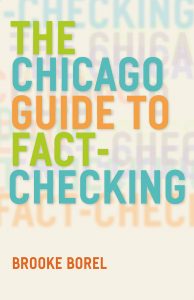Brooke Borel on fact-checking and fake news

Brooke Borel, the author of The Chicago Guide to Fact-Checking, on “Fact-Checking Won’t Save Us from Fake News,” at FiveThirtyEight:
As for tech, fact-checking and blocking fake news sites from advertising dollars is a start, but it’s not enough. Facebook and Google keep giving users more of what they want to see through proprietary algorithms. This may be great for entertainment, but it doesn’t help when it comes to news, where it may just strengthen existing bias. “Facebook was not designed for this purpose,” said Claire Wardle, research director at First Draft News, a network of newsmakers and academics who provide resources on checking and verifying stories on social media. “It has become the civic town hall, but it was never designed to be.”
Tech’s role isn’t only about stifling fake news on social media. Some companies and academics are building algorithms that can help fact-check portions of the web. Here, the key will be not only computer programming, but also transparency in terms of how those algorithms are constructed and building trust by showing how a fact-check is sourced, said Dhruv Ghulati, co-founder of the fact-checking system Factmata.
As for readers, we’re the ones consuming all this news. Our clicks feed ads and show media companies what sorts of stories go viral — which can lead to more of those types of stories. Social media has also effectively turned us all into publishers. Each time you like a Facebook post, your connections become a new audience. And it has your implicit signature of approval. We can think before we click: Who is providing this news? Do they have incentives to lie? And if we see our connections spreading lies, how might we confront them?
“We should have the sense of responsibility that anything you click on will affect other people,” Lee said. “I always tell my students: ‘Click like you mean it.’”
But whether we can collectively organize to break the cycle of fake news may depend on how high the stakes climb — and how willing we are to push back against it. “I don’t want to sound alarmist, and I don’t mean to sound pessimistic, but in some ways the way a cycle changes is that people get really tired of it. They get sick of how it makes them carry on public life,” Tucher said. “Enough people decide they aren’t going to do it anymore.”
***
To read more about The Chicago Guide to Fact-Checking, click here.
To read Borel’s piece in full at FiveThirtyEight, click here.